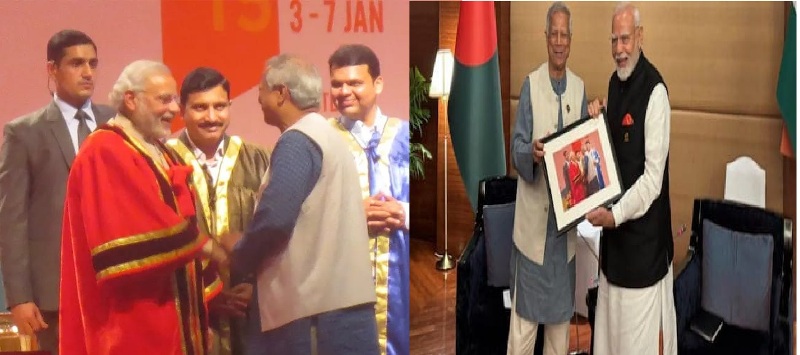Both the Indian and Bangladeshi sides at the BIMSTEC Summit venue acted in accordance with a script: maintain distance and stoic silence on Day 1 of the two-day BIMSTEC event in the Thai capital.
An air of suspense was built over a likely meeting between Indian Prime Minister Narendra Modi and Bangladesh interim authority Chief Advisor Mohammad Yunus. Will they, won’t they?
The two finally met on April 4, after eight months of total silence, even as their respective foreign ministry senior officials kept in touch over a range of issues.
But a framed photograph dating back a few years ago, featuring Modi presenting an award to Yunus in some programme, said it all. The Yunus-led Bangladeshi delegation had come prepared for an eventual meeting in Bangkok. Some might say this photograph, which Yunus gifted to Modi as a memento, was brought along in anticipation of a meeting with the Indian prime minister.
But Bangladesh foreign ministry sources revealed that Yunus’ office and their own establishment had some foreknowledge of the impending meeting and therefore carried the memento along from Dhaka. Some suspense was sought to be created for public consumption in India as well as Bangladesh.
What strikes out is that a day after the tension of April 3 – both leaders sat grim-faced at the inaugural ceremony of the BIMSTEC conference, when Ramakien, the Thai version of the Indian Ramayana, was staged – was the perfect charade.
The next day, when the two leaders met, their handshake was firm and warm. Effusive smiles wreathed the faces of both. Indeed, the Indian side was the host for the meeting as the team stood up to welcome the Bangladeshi Chief Advisor before the formal meeting got underway.
At the end of the 30-minute bilateral meeting, the Bangladeshi delegation projected the parlay as a “success” as it sought to send across a message back home that Yunus and his team really wanted the confabulation even after veiled threats related to India’s northeast a few days ago in Beijing.
The Ministry of External Affairs’ statement issued after the bilateral meeting reflected some of India’s concerns. But, curiously enough, it left out two far more critical issues than the condition of minorities, including Hindus, “a democratic, stable, peaceful, progressive and inclusive Bangladesh”.
The first is concerns over when elections would be held so that a political party is elected popularly to govern Bangladesh. The second, far more important from India’s perspective, is the widespread rise of Islamist extremism in that country which did not find explicit mention in the statement.
This assumes importance as a few days ago, the MEA had informed the ministry-related Parliamentary Standing Committee that the Indian foreign and security establishments had serious concerns over the release of violent Islamic extremists previously convicted of serious offences, which were considered a threat to regional and global security.
The MEA informed the committee that while Bangladesh Army chief General Waker-uz-Zaman had publicly acknowledged the risks posed to that country by internal conflicts and instances of mob violence, destruction of property and offences against women and minorities.
ALSO READ: Did an ‘invisible hand’ push India to talk to Bangladesh’s Yunus in Bangkok?
However, the Yunus-led internal administration did not acknowledge violence against minorities, primarily Hindus, dismissing them as generally directed against Awami League supporters, the committee was informed. Other Indian officials said this reflected the Yunus-led authority’s “callous attitude” towards all kinds of violence perpetrated against people in general, for which there should be “zero tolerance”.















